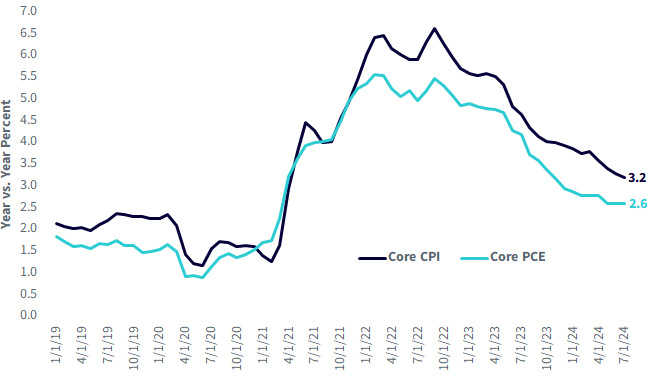By: Kevin Flanagan, Head of Fixed Income Strategy
Key Takeaways
- The Federal Reserve is now prioritizing labor market data over inflation in its decision-making process.
- Inflation remains relevant, but as long as disinflation continues, the Fed can focus more on employment.
- Current core inflation measures are above the Fed’s 2% target, but rate cuts are expected to proceed as long as disinflation persists.
With Labor Day now in the rearview mirror, the money and bond markets will no doubt become laser focused on the September FOMC meeting. Yes, Fed Chair Powell telegraphed that a rate cut is forthcoming, but he also emphasized how monetary policy is still data dependent. This data dependency is no longer determining if/when a rate cut could be coming, but rather, it plays the key role in what the looming easing cycle will look like. Based on Powell & Co.’s recent remarks, the number one focus in the Fed’s dual mandate of inflation and employment will now apparently be flip-flopped. In other words, inflation will be taking a back seat to future labor market data.
Now, does that mean inflation has fallen completely off the FOMC’s radar? No, not at all. As long as the current disinflation trend remains intact, the policy makers can tilt their focus more to the employment aspect of their dual mandate. In fact, based on recent Fedspeak, one gets the sense there is some anxiety about the labor market cooling too much.

But, what about inflation? It has become increasingly apparent the Fed will not come anywhere close to their 2% target as rate cuts get underway. And I’m not just talking about the first cut either. Given where current core inflation measures reside, it seems obvious that the rate cut process will be in full swing as long as there is not a reversal of the disinflation trend whereby price pressures re-emerge.
Let’s take a look at the two closely watched core inflation gauges to get some perspective. Through July, the latest data available, core CPI, was still increasing at a 3.2% annual rate while the Fed’s own preferred measure, the core PCE deflator, was rising at a 2.6% year-over-year clip. Interestingly, the core PCE reading is below the Fed’s most recent median estimate of 2.8% for 2024, but it is still measurably above their stated goal of a 2% target. In fact, the annualized gain for core PCE has remained at this 2.6% pace for three months in a row.
Conclusion
Pre-Jackson Hole, that type of inflation outcome would have more than likely been viewed through a different prism by the money and bond markets. However, post-Jackson Hole, the Treasury arena now knows what the primary driver is for future Fed policy decision-making: jobs, jobs, jobs.
This post first appeared on September 4, 2024 on the WisdomTree blog
PHOTO CREDIT: https://www.shutterstock.com/g/pogonici
VIA SHUTTERSTOCK
DISCLOSURES:
U.S. investors only: Click here to obtain a WisdomTree ETF prospectus which contains investment objectives, risks, charges, expenses, and other information; read and consider carefully before investing.
There are risks involved with investing, including possible loss of principal. Foreign investing involves currency, political and economic risk. Funds focusing on a single country, sector and/or funds that emphasize investments in smaller companies may experience greater price volatility. Investments in emerging markets, currency, fixed income and alternative investments include additional risks. Please see prospectus for discussion of risks.
Past performance is not indicative of future results. This material contains the opinions of the author, which are subject to change, and should not to be considered or interpreted as a recommendation to participate in any particular trading strategy, or deemed to be an offer or sale of any investment product and it should not be relied on as such. There is no guarantee that any strategies discussed will work under all market conditions. This material represents an assessment of the market environment at a specific time and is not intended to be a forecast of future events or a guarantee of future results. This material should not be relied upon as research or investment advice regarding any security in particular. The user of this information assumes the entire risk of any use made of the information provided herein. Neither WisdomTree nor its affiliates, nor Foreside Fund Services, LLC, or its affiliates provide tax or legal advice. Investors seeking tax or legal advice should consult their tax or legal advisor. Unless expressly stated otherwise the opinions, interpretations or findings expressed herein do not necessarily represent the views of WisdomTree or any of its affiliates.
The MSCI information may only be used for your internal use, may not be reproduced or re-disseminated in any form and may not be used as a basis for or component of any financial instruments or products or indexes. None of the MSCI information is intended to constitute investment advice or a recommendation to make (or refrain from making) any kind of investment decision and may not be relied on as such. Historical data and analysis should not be taken as an indication or guarantee of any future performance analysis, forecast or prediction. The MSCI information is provided on an “as is” basis and the user of this information assumes the entire risk of any use made of this information. MSCI, each of its affiliates and each entity involved in compiling, computing or creating any MSCI information (collectively, the “MSCI Parties”) expressly disclaims all warranties. With respect to this information, in no event shall any MSCI Party have any liability for any direct, indirect, special, incidental, punitive, consequential (including loss profits) or any other damages (www.msci.com)
Jonathan Steinberg, Jeremy Schwartz, Rick Harper, Christopher Gannatti, Bradley Krom, Kevin Flanagan, Brendan Loftus, Joseph Tenaglia, Jeff Weniger, Matt Wagner, Alejandro Saltiel, Ryan Krystopowicz, Brian Manby, and Scott Welch are registered representatives of Foreside Fund Services, LLC.
WisdomTree Funds are distributed by Foreside Fund Services, LLC, in the U.S. only.
You cannot invest directly in an index.



